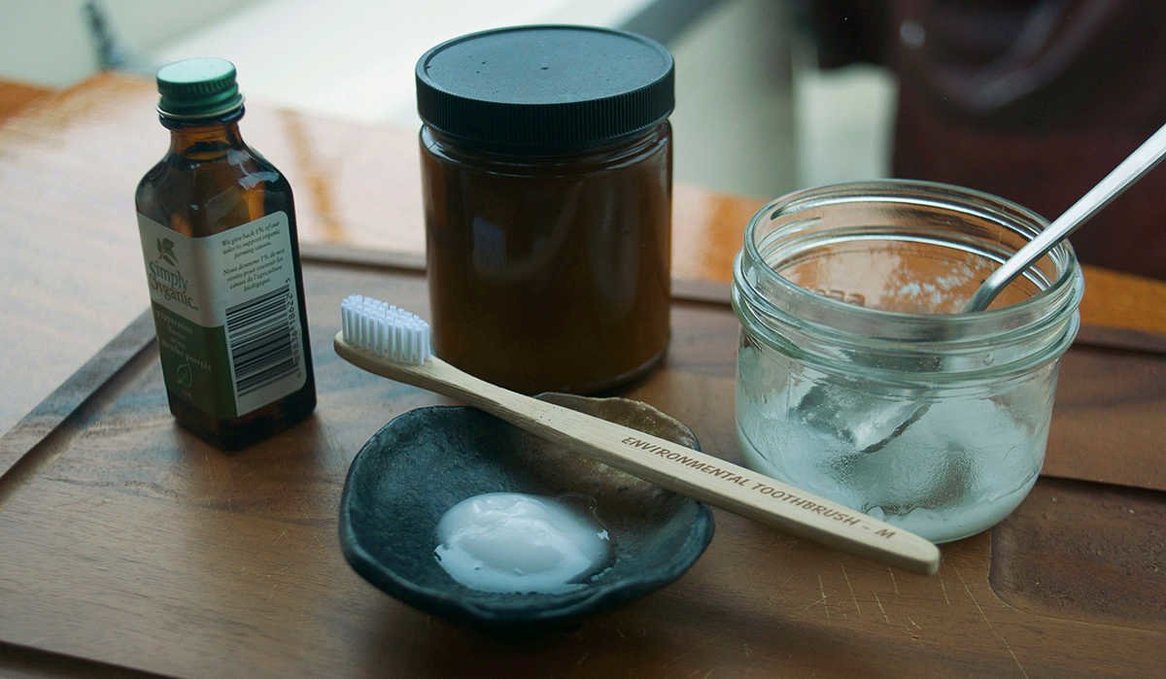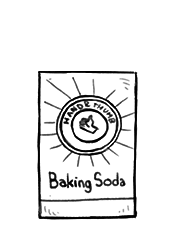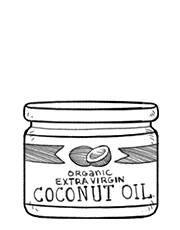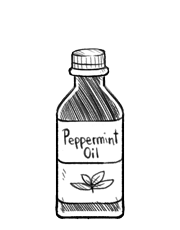basic toothpaste
1 jar — 5 minutes

In the last couple of years, we've removed most pre-made cleaning and hygiene products from our lives. In fact, we don't use shampoo at all anymore. We make our own toilet cleaner, kitchen cleaner, and we also make our own toothpaste.
Chances are you already have all of the ingredients at home to make it. The recipe consists of baking soda, coconut oil and peppermint oil (food grade).
You can also brush your teeth with a simple baking soda and water mix (mix 1 tsp of baking soda with a small amount of water). Baking soda's relatively low abrasivity is enough to remove accumulations on teeth, and it rinses clear leaving a lightly salty taste. It's important to dilute the baking soda, as too much can be damaging. For those who dislike brushing with a salty taste, adding peppermint oil helps to smooth down both the taste and texture, although this ingredient is for taste, and it isn't yet known if is truly effective against oral diseases.
As for the use of coconut oil, it is thought to reduce plaque after continued use. A downside to using coconut oil, is that it becomes solid in cold climates, and it's necessary to melt it down before using it. We like to put the jar near a source of heat for 5 minutes or so. Another detail to consider, is that the oil may clog your drain in cold weather. We've noticed this on our boat, and so we spit in a glass and pour it overboard.
The ingredients in homemade toothpaste vary, some add bentonite clay and other essential oils, so we opted for the simplest recipe possible. Homemade toothpaste is controversial, as recipes lack fluoride, an ingredient that reduces cavities and that addresses other oral health conditions, but we believe that toothpaste is only as good as your brushing (which should last for a min of 2 min). It is more important to brush your teeth thoroughly than to use toothpaste, especially after eating sweets. In all, we prefer to avoid packaging and make our own, it works for us and it might work for you too.
Abrasion properties of baking soda
Tooth enamel is the hardest substance in the body, but some brands of abrasive toothpaste can wear it down, exposing the dentin lying beneath. To help quantify the abrasivity of dentifrices, researchers established a standardized scale called Relative Dentin Abrasivity (RDA). This scale assigns toothpaste an abrasivity value, relative to a standard reference abrasive that is arbitrarily given an RDA value of 100. All dentifrices at or below 2.5 times the reference value, or 250 RDA, are considered safe and effective [1]. In fact, clinical evidence supports that lifetime use of proper brushing technique with a toothbrush and toothpaste at an RDA of 250 or less produces limited wear to dentin and virtually no wear to enamel [2]. Sodium bicarbonate (baking soda) has a Mohs hardness value of 2.5 and an RDA value of 7.
Sources
[1] St John S, White DJ. History of the Development of Abrasivity Limits for Dentifrices. J Clin Dent 2015;26(2):50-4.
[2] Hunter ML, Addy M, Pickles MJ, Joiner A. The Role of Toothpastes and Toothbrushes in the Aetiology of Tooth Wear. Int Dent J 2002;52:399-405.
 baking soda15 g
baking soda15 g coconut oil45 ml
coconut oil45 ml peppermint oil2.5 ml
peppermint oil2.5 ml
toothpaste
- Mix 15 g (1 tbsp) of baking soda with 45 ml of extra virgin coconut oil. If the coconut oil is hard, melt it down and mix it with the dry ingredients
- Add 2.5 ml (1/2 tsp, 10 drops) of food grade peppermint oil.
- Mix everything up and brush your teeth. Evidently, like regular toothpaste, don't swallow it.
